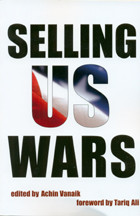Selling US Wars
Topics
Regions
Selling US Wars is a valuable, information-filled collection of essays by renowned experts from around the world which examines the excuses for war that were the basis for this period of the US empire drive—nuclear weapons, terrorism, "failed states," drugs, humanitarian intervention, and democracy.

Authors
Ideas have consequences review by M.V.Ramana, Economic and Political Weekly, December 2007
Review by Praful Bidwai (Frontline, 9 May 2007)
Achin Vanaik presents the book (video) Felix Meritis, Amsterdam, 17 June 2007
- Introduction
by Achin Vanaik
The real reasons for the war in Iraq—control of oil pricing and policies, expansion of US power, strategic establishment of US bases in the Middle East, defense of Israel—were kept hidden from the American people. Instead, justifications for the illegal war were cloaked in the high-sounding slogans of "fighting the war on terrorism," "keeping nuclear weapons out of the hands of rogue states," and finally, "bringing democracy to the Middle East."
Selling US Wars is a valuable, information-filled collection of essays by renowned experts from around the world. It examines the excuses for war that were the basis for this period of the US empire drive—nuclear weapons, terrorism, "failed states," drugs, humanitarian intervention, and democracy—and analyzes the pretexts asserted for the US invasions of Afghanistan and Iraq, as well as Washington's aggressive policies elsewhere, including in Colombia, Palestine, and Iran. It gets behind the subterfuges to expose how Washington's spin-doctors worked to present its wars as humane, lawful, and necessary to keep Americans safe—and why the campaigns sometimes succeeded.
The book includes an overview of the economics of empire from Walden Bello, director of Focus on the Global South in the Philippines; a piece on the ideology of empire and the rise of the neo-conservative right-wing by legendary writer Susan George in France; an essay by Mike Marqusee in the UK on American exceptionalism and how that phenomenon helped shape US popular acceptance of these "slogans”; and contributions by Tariq Ali, Achin Vanaik, Phyllis Bennis, David Bewley-Taylor, David Sogge, Mariano Aguirre, Martin Jelsma, and Zia Mian.
Achin Vanaik is professor of international relations and global politics at Delhi University, and a fellow of the Transnational Institute. His most recent book is Globalization and South Asia: Multidimensional Perspectives (editor). He is also co-author of New Nukes: India, Pakistan and Global Nuclear Disarmament.
Tariq Ali is a widely known London-based writer, filmmaker and anti-war agitator. He is the author of Bush in Babylon and Clash of Fundamentalisms.
David Bewley-Taylor is professor of American foreign policy at the University of Wales Swansea, United Kingdom and the author of The United States and International Drug Control: 1909–1997 (Pinter 1999 & Continuum 2001).
David Sogge is an independent consultant to NGOs on development aid and aid policy and a specialist on Southern Africa. He is Fellow of the Transnational Institute and author of Give & Take: What’s the Matter with Foreign Aid? (Zed Books, 2002).
Mariano Aguirre is the director of the Spanish international relations foundation FRIDE, a fellow of the Transnational Institute, and author of La ideología neoimperial: La crisis de EEUU con Irak (Icaria, 2003).
Martin Jelsma is coordinator of the Transnational Institute Drugs & Democracy Program and a fellow of the institute. He is the editor of Trouble in the Triangle: Opium and Conflict in Burma (Silkworm, 2005).
Mike Marqusee is the author of a number of groundbreaking books on politics and popular culture, including Wicked Messenger: Bob Dylan and the 1960s Chimes of Freedom, Anyone but England, War Minus the Shooting, and Redemption Song.
Phyllis Bennis is Fellow of the Institute or Policy Studies, Washington, DC, and is also a fellow of the Transnational Institute. Her most recent book is Challenging Empire: How People, Governments and the UN Defy US Power (Olive Branch Press, 2006).
Susan George is Vice President of ATTAC France and Chair of the Planning Board of the Transnational Institute. She is the author of Nous, Peuple d’Europe (Fayard, 2005).
Walden Bello is the director of Focus on the Global South, program board member of the International Centre for Trade and Sustainable Development in Geneva, and fellow of the Transnational Institute. He is author of Dilemmas of Domination: The Unmaking of the American Empire (Metropolitan, 2005).
Zia Mian is lecturer in public and international affairs at the Woodrow Wilson School, Princeton University, and the editor of Out of the Nuclear Shadow (Lokayan/Rainbow, 2001).
Acknowledgments
Foreword Tariq Ali
Introduction
Achin Vanaik
The capitalist conjuncture: overaccumulation, financial crises, and the retreat from globalization
Walden Bello
Manufacturing common sense, or cultural hegemony for beginners
Susan George
The iron click: american exceptionalism and us empire
Mike Marqusee
Political terrorism & the us imperial project
Achin Vanaik
The empire of fear
Zia Mian
Humanitarian intervention & us hegemony:
a reconceptualization
Mariano Aguirre
And the name for our prophet is democracy
Phyllis Bennis
Something out there: state weakness as imperial pretext
David Sogge
The internationalization of the war on drugs:
illicit drugs as moral evil & useful enemy
David Bewley-Taylor & Martin Jelsma
Conclusion Achin Vanaik
Contributors
Notes
Index
This book was published in India as 'Masks of empire', Tulika books, 2007
To order go to Interlink Publishing

